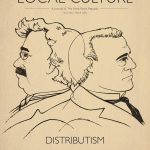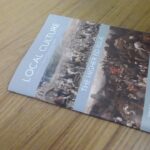“Spring 2022.” The Berry Center’s spring newsletter has several good pieces, including Wendell Berry’s note of gratitude for the continued practice of local subsistence, in this case manifest during a hog butchering.
“The Pandemic Gave Small Farmers an Upper Hand for Once. Now What?” John-Paul Heil talks with several small-scale farmers about whether the increased interest in locally grown food has continued into another growing season: “When I ask what the average person can do to support the farms’ work of building local culture and agriculture, the farmers are unanimous: Get involved.”
“How a Nebraska Ethanol Plant Turned Seeds into Toxic Waste.” Diana Kruzman describes the ongoing damage caused by an ethanol plant’s hazardous waste. The plant has been shut down, but locals have to deal with its messy legacy.
“To Fight Climate Despair, this Christian Ecologist says Science isn’t Enough.” Sarah Pulliam Bailey profiles ecologist Rick Lindroth and describes his approach to the despair-inducing findings of climate scientists: “People will care for the things that they love. . . . They love the things they’re intimately connected to.”
“The Future of Anglicanism is African.” Tomiwa Owolade explores the “pizza effect” as it pertains to Christianity’s spread in Britain: “Christianity can accommodate tension. It is both radical and conservative: it proclaims the downtrodden will inherit the earth and it praises life-long monogamy. It incorporates the puritanical fervour of Leviticus and the ravishing sensuality of the Song of Solomon. Its central figure is both a man who was abused and spat on and crucified, like a slave, but also a figure of transcendent divinity. What can be more beautifully Christian than the fact its future in the bosom of what was once the largest empire in the world is now being sustained by communities it once colonised?”
“Inside Tucker Carlson’s Brain.” Gabby Birenbaum and Phillip Longman try to narrate the many people and organizations in the post-liberal orbit (including a discussion of FPR). I don’t think they always get the influences and emphases right, but they do a fine job making the case that there’s plenty of room for common ground on policy among people with different motivations and convictions.
“Why We Don’t Eat Matzah All Year Long.” Martin Schell reflects on the seder and draws analogies to how we should remember painful episodes in our history: “Let’s constrain the dry flavor of the past to a remembrance rather than exalt it as a guiding light.”
“Back from the Dead? Elusive Ivory-Billed Woodpecker not Extinct, Researchers Say.” Oliver Milman reports on a recent expedition deep into Louisiana swamps that captured images of ivory-billed woodpeckers.
“Beware, Party Bosses, the Rise of the Unaffiliateds is Coming for You.” Tony Woodlief chronicles the rise of fed up, independent voters and concludes that “the party bosses are sitting atop dying brands.”
“The Nuclear Missile Next Door.” Eli Saslow visits a ranch in Montana where cows and sheep graze and a nuclear warhead lurks in an underground silo.
“Bolt-Hole.” Patrick Laurie describes what it’s like to have a neighbor who isn’t a neighbor. (Recommended by Brian Miller.)
“Rediscovering ‘Third Place’ Friendships in a Post-Pandemic World.” Bruno V. Manno reminds us of the importance of “third places” in fostering healthy communities and forming friendships across various dividing lines.
“The Love Feast.” Alan Jacobs revisits W.H. Auden’s poetry on the occasion of a new two volume edition of his collected poems: “In the second half of his career, Auden patiently worked out, in both prose and masterful verse, the implications of his homemade anthropology—his own account of what his friend Hannah Arendt would later call, in a 1958 book, The Human Condition. That anthropology ultimately centers on two core propositions: that we are prone to trust and love what breaks our hearts, and that we are creatures alongside the birds and the social insects, albeit creatures who, as he says in one poem, have ‘assumed responsibility for time.’”
“The Liberal Order and Its Haters.” Matthew Loftus has a brief yet helpful essay defining some key terms in the postliberal critique of “the liberal order or liberalism—this interwoven overemphasis on liberty and autonomy that dissolves our shared connection with the earth, one another, and our selves.”
“The Stunning Rise of Cremation Reveals America’s Changing Idea of Death.” Karen Heller tries to explain why cremations have doubled in popularity over the past twenty years. The rituals surrounding our experience of death are shifting quickly and reveal our culture’s uneasiness with death and the limits it reminds us of.
“The Bones of Memory.” Dori Moody offers a contrasting account of how the Bruderhof care for their dead.






